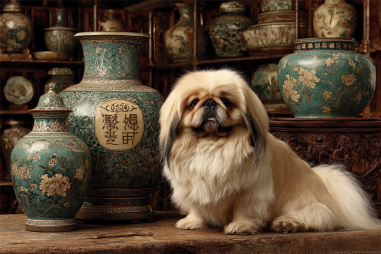Pekingese dogs have long captivated dog enthusiasts with their regal appearance and distinctive personality. This ancient breed, famously favored by Chinese royalty, combines charm, independence, and loyalty in a way that makes them truly unique companions. If you’re considering adding a Pekingese to your family or simply want to understand them better, grasping their temperament and personality is essential. In this article, we’ll explore what makes the Pekingese tick, how they interact with family and other pets, their intelligence levels, and who will thrive alongside this remarkable breed.
Key Personality Traits
The Pekingese is a dog that exudes a personality as striking as its lion-like mane. One of the breed’s most defining traits is its strong independence. Despite being affectionate, Pekingese dogs are known for their self-reliant nature, often displaying a dignified air sometimes described as “royal.” They aren’t typically the type to demand constant attention but will shower their chosen humans with loyalty when they bond deeply.
Another hallmark of their personality is a certain stubbornness. Pekingese dogs think for themselves and may resist commands if they don’t see the point. They are confident and can be quite determined, which means that patience and consistency are key when interacting with them.
At the same time, Pekingese often have a sweet and loving side, particularly toward those they trust. They tend to form strong attachments and demonstrate a protective streak that echoes their regal origins. This combination of independence and devotion means Pekingese have a nuanced personality that rewards understanding and respect from their owners.
Interaction with Family Members
When it comes to family life, the Pekingese is often a devoted and watchful companion. They may be reserved or even aloof with strangers, but they show warmth and affection within their close-knit family circle. This breed thrives on gently consistent interaction rather than boisterous activity.
Children should be taught to treat Pekingese with kindness and respect, as these dogs generally prefer calm environments over loud or chaotic ones. Because of their small size and sometimes delicate build, they can be sensitive to rough handling.
In households where family members appreciate a pet that isn’t overly demanding but still provides loyal companionship, Pekingese fit in wonderfully. They tend to enjoy being near their humans, often choosing a favorite spot to keep watch over their loved ones.
Behavior with Other Pets
Pekingese can get along well with other pets if properly socialized from an early age. Given their naturally confident and sometimes territorial nature, they might initially be wary or assertive around unfamiliar animals.
When living with other dogs, Pekingese often do best if the introduced pets have a calm demeanor and don’t overwhelm them with high energy or rough play. They are not typically pack-oriented dogs and may prefer a quiet coexistence rather than constant interaction.
With cats or smaller animals, their behavior will largely depend on their socialization history and individual personality. Some Pekingese display a protective attitude toward other pets in the household, acting like a little guardian. However, their trial-and-error approach to new companions means early introductions and close monitoring are crucial to fostering harmony.
Intelligence and Trainability
Pekingese are intelligent dogs, but their intelligence often comes paired with a strong-willed streak that makes training a distinctive challenge. Unlike highly eager-to-please breeds, Pekingese tend to weigh instructions against their own judgment, and they may sometimes choose to ignore commands if they’re not motivated.
Training a Pekingese is a process that requires patience, creativity, and the use of positive reinforcement techniques. They respond best to rewards like small treats or affection rather than harsh correction. Establishing a trusting bond is key to encouraging cooperation.
Because of their stubbornness, it’s essential for owners to keep training sessions short and engaging to maintain the Pekingese’s interest. Consistency in commands and routines works well for helping them learn desired behaviors. They are quick learners when training appeals to their independent nature and makes sense to them.
Managing Stubborn or Protective Tendencies
The Pekingese’s protective side is one of its defining traits, bred originally to guard their owners and prized treasures. This can translate to alertness and suspicion around strangers or unfamiliar situations. While they are not typically aggressive, they can bark to warn their family of potential threats and may challenge perceived intruders.
Dealing with their stubbornness requires a balanced approach. Owners should avoid forceful methods that can cause resistance or stress. Instead, gentle leadership, clear boundaries, and consistent routines help the Pekingese feel secure and more cooperative.
Socialization from a young age is critical to managing protective behaviors effectively. Exposing them regularly and positively to a variety of people, animals, and environments reduces the likelihood of fear-based reactions or over-guarding tendencies.
Suitable Owners for the Pekingese Temperament
Pekingese dogs are best suited for individuals or families who appreciate their unique blend of independence and affection. Ideal owners are those who:
- Value a calm, low-to-moderate activity companion rather than a highly energetic dog
- Have the patience for consistent, gentle training methods with a stubborn but intelligent dog
- Provide a stable and quiet home environment that respects the Pekingese’s sensitive nature
- Understand the importance of early socialization and ongoing mental stimulation
- Are prepared to manage grooming needs and special care for this breed’s distinctive coat and health requirements
Pekingese can thrive with older children and adults who are attentive to their needs. They are particularly compatible with owners who enjoy a dog that offers quiet companionship and quiet loyalty rather than constant activity.
Warm Companions with a Noble Spirit
Understanding the temperament and personality of the Pekingese reveals why this breed has won hearts for centuries. Their unique blend of regal independence, loyalty, and affectionate protectiveness makes them special companions for the right family. While they may require patience and gentle guidance, the rewards of their devoted and dignified presence are well worth it. With the right care and understanding, Pekingese dogs continue to shine as little lions with a big heart.







